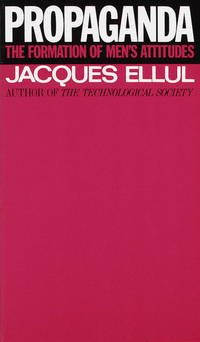Jacques Ellul: Propaganda: The Formation of Men’s Attitudes (1962/1973)
Filed under book | Tags: · agitprop, democracy, ideology, marxism, mass media, propaganda, soviet union, technology, totalitarianism

“A far more frightening work than any of the nightmare novels of George Orwell. With the logic which is the great instrument of French thought, [Ellul] explores and attempts to prove the thesis that propaganda, whether its ends are demonstrably good or bad, is not only destructive to democracy, it is perhaps the most serious threat to humanity operating in the modern world.” –Los Angeles Times
Originally published in French as Propagandes by A. Colin, Paris, 1962.
Translated by Konrad Kellen and Jean Lerner
With an introduction by Konrad Kellen
Publisher Vintage Books, Random House, New York, 1973 (reprint of the Alfred A. Knopf 1965 edition)
Vintage political science and social criticism
ISBN 0394718747, 9780394718743
332 pages
PDF (updated on 2012-7-17)
Comment (1)Aleksandra Sekulić (ed.): Media Archaeology: The Nineties (2009)
Filed under book | Tags: · 1990s, mass media, media archeology, memory, serbia, television, war, yugoslavia

Media Archaeology is a long term research and program project, initiated in Archive of alternative film and video in “Students’ City” Cultural Center in Belgrade, programs initially hosted by Academic Film Center in 2006. Dealing with media forms as symptoms of social phenomena the team of the project presented this research through a dynamic program model of screening and discussion between two hosts with participation of the audience, which turned out to be a right model to establish a communication with the generation who hadn’t have a chance to experience the appearance and transformation of particular media phenomena.
In 2007, the series of lectures which embraced particular media forms from the history of media production of Socialist Federal Republic of Yugoslavia, with a special program dedicated to the translation of Western pop culture in Asia, the program concept enabling communication with the younger audience, with creating an insight into their perception of contemporary media forms was established, and also opened a call for collecting material for a media archive.
In 2008, with the support of the ministry of culture and media of the Republic of Serbia, a project Media Archaeology: The Nineties was initiated, and focused on analysis of the models used for media coverage and shaping of the disastrous social crisis of the 1990’s and to remind of the depth and the long term influences of the changes still visible in media production.
Project team: Boško Prostran, Jovan Bačkulja, Stevan Vuković, Aleksandra Sekulić, Ivica Đorđević, Nebojša Petrović
Translation: Vesna Jovanović, Aleksandra Sekulić, Greg de Cuir
Publisher: Center for cultural decontamination; with Archive of alternative film and video, “Students’ City” Cultural Center, Belgrade, September 2009
35 pages
authors and project (incl. video archive)
Comment (0)Robert T. Holt: Radio Free Europe (1958)
Filed under book | Tags: · bulgaria, central europe, communism, czechoslovakia, history, hungary, mass media, poland, politics, propaganda, public broadcasting, radio, romania, southeastern europe

What is radio Free Europe? Where does it broadcast? Who runs it? What are its purposes? Although thousands of Americans are familiar with Radio Free Europe (many have contributed to its support through the Crusade for Freedom campaigns), few know enough about its background to answer these and similar questions. In this book a political scientist with first-hand knowledge gives a detailed account of the organization and development of this unique propaganda enterprise.
Radio Free Europe was established as a private broadcasting project in 1949 by the Free Europe Committee, headed by Joseph C. Grew, as part of the Committee’s program of broad, long-range assistance to democratic exiles from totalitarian countries. The operational headquarters are located at Munich, and the broadcasts are directed to the people of five satellite countries: Czechoslovakia, Hungary, Romania, Bulgaria, and Poland.
Professor Holt tells how Radio Free Europe was established, outlines its basic policies and objectives, describes its organization, personnel, programming, and services, discusses transmission problems, and examines the effectiveness of the propaganda. He describes in detail the role of RFE in connection with the uprisings in Poland and Hungary and analyzes the charges that RFE stimulated the Hungarian revolt.
Publisher University of Minnesota Press, 1958
ISBN 978-0-8166-5788-9
249 pages

